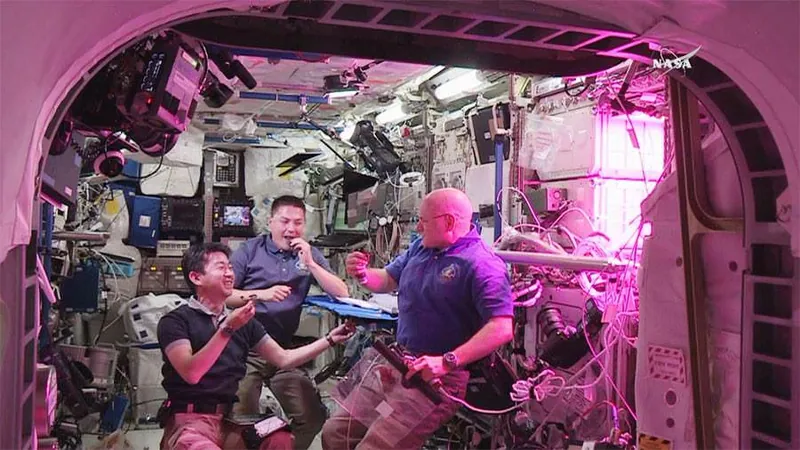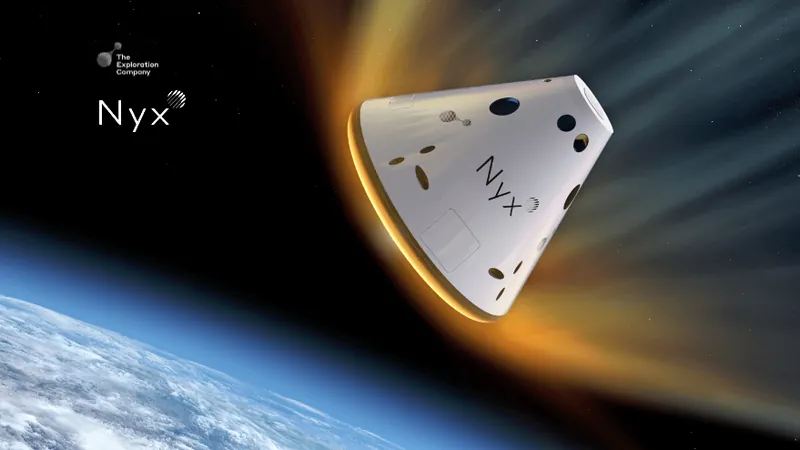
Are We Ready for the Nutritional Challenges of Long-Duration Spaceflight?
2024-10-28
Author: Arjun
Introduction
As humanity gears up for what many consider the next giant leap—the first manned mission to Mars—experts are identifying crucial barriers that could hinder the success of such ambitious endeavors. Among these, one critical element has emerged: astronaut nutrition.
Current Understanding of Astronaut Nutrition
Current missions aboard the International Space Station (ISS) have improved our understanding of how astronauts cope with prolonged exposure to microgravity and radiation. However, missions to Mars will be unprecedented, potentially lasting years as astronauts travel for 6 to 7 months to reach the planet and may spend up to 500 days on the Martian surface. Resupplying from Earth is simply not an option, setting up myriad challenges around sustaining the crew, the most pressing being their nutritional needs.
The Importance of Nutrition
NASA's research indicates that nutrition is not just a dietary concern but a vital pillar for maintaining astronaut health under strenuous conditions. The risks associated with low gravity and heightened radiation exposure are well-documented—they can lead to muscle atrophy and decreased bone density, not to mention increase the risk of cancers and degenerative diseases. But when you combine these with the psychological and physical strains of extended isolation, the picture becomes even more complex.
Key Resource in Nutritional Investigations
A cornerstone resource in this investigation is the comprehensive PDF book titled “Human Adaptation to Spaceflight: The Role of Food and Nutrition,” now in its second edition. Authored by a team of experts in fields including nutrition and space medicine, the book revisits the historical significance of proper nutrition in exploration and emphasizes its critical role in the success of space missions.
Historical Perspective
Historically, explorers faced food shortages and nutritional challenges on epic voyages. However, astronauts have the additional hurdle of not being able to forage for food along their journey. This reality necessitates an entirely new approach to food systems that must be as reliable as the spacecraft itself.
Research and Findings
Utilizing parallels from terrestrial research—such as studies conducted in Antarctica that highlight isolation and reduced sunlight, and the effects of prolonged bed rest—scientists are investigating what astronauts might require nutritionally during long missions. But the findings underscore an alarming truth: the United States currently lacks a robust food system to meet these needs in the harsh environment of space.
The Desire for Fresh Food
Interestingly, while ISS astronauts have access to some variety in their diets through Crew Specific Menu (CSM) selections, which account for 10-20% of their caloric intake, they still express a desire for more fresh food options. Experiments in growing food, such as leafy greens, have offered a glimpse of potential but highlight just how far we are from sustaining an entire crew through self-grown provisions.
Nutritional Supplements vs. Whole Foods
Moreover, the question arises: Can nutritional supplements compensate for the lack of fresh food? The evidence suggests otherwise. Studies have indicated that whole foods provide health benefits that supplements simply cannot replicate. Alarmingly, certain vitamins have been found to increase cancer risks when taken in excess as supplements.
Social Dynamics and Morale
The stakes go beyond mere nutrition; they tap into social dynamics as well. Providing astronauts with a variety of acceptable and enjoyable food could play a vital role in maintaining morale and fostering a sense of community onboard—a crucial factor in a confined environment for extended periods.
Conclusion
Despite these challenges, researchers insist that a complete food system must be developed to guarantee the well-being of astronauts. Without it, the quest for Mars could be jeopardized, and the health of the crew could face dire consequences.



 Brasil (PT)
Brasil (PT)
 Canada (EN)
Canada (EN)
 Chile (ES)
Chile (ES)
 Česko (CS)
Česko (CS)
 대한민국 (KO)
대한민국 (KO)
 España (ES)
España (ES)
 France (FR)
France (FR)
 Hong Kong (EN)
Hong Kong (EN)
 Italia (IT)
Italia (IT)
 日本 (JA)
日本 (JA)
 Magyarország (HU)
Magyarország (HU)
 Norge (NO)
Norge (NO)
 Polska (PL)
Polska (PL)
 Schweiz (DE)
Schweiz (DE)
 Singapore (EN)
Singapore (EN)
 Sverige (SV)
Sverige (SV)
 Suomi (FI)
Suomi (FI)
 Türkiye (TR)
Türkiye (TR)
 الإمارات العربية المتحدة (AR)
الإمارات العربية المتحدة (AR)